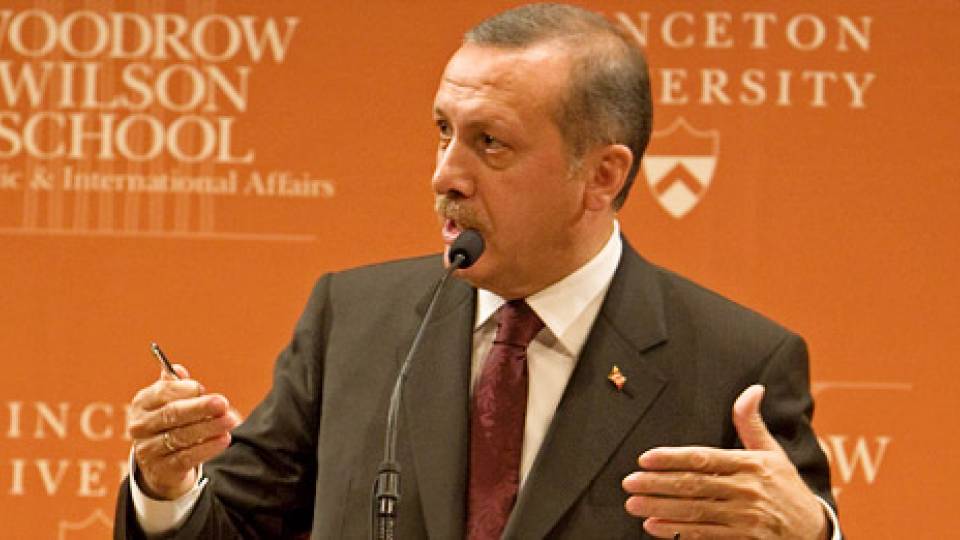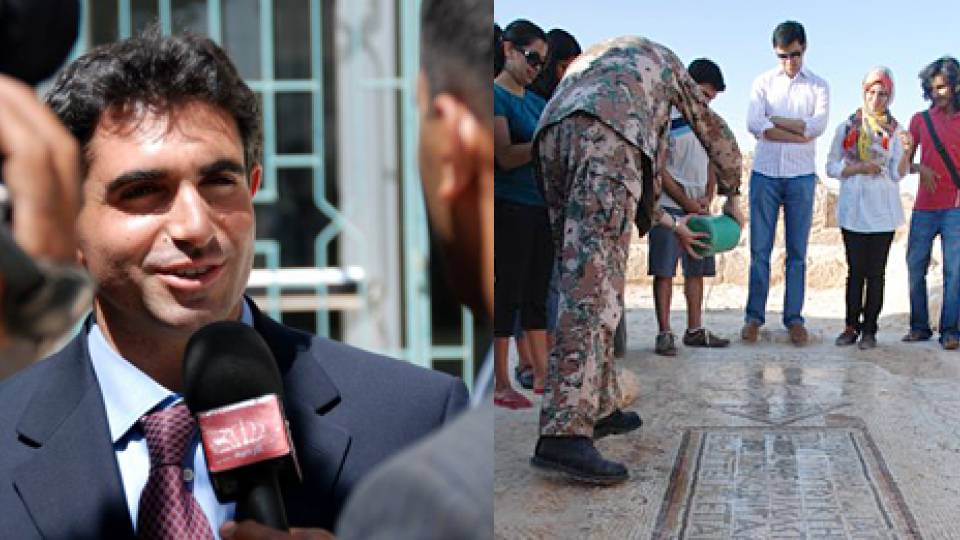From the May 2, 2005, Princeton Weekly Bulletin
As students decamped to various destinations over spring break, one group led by international diplomacy expert Wolfgang Danspeckgruber headed to a tiny principality in Europe to address major global issues.
Danspeckgruber, director of the University’s Liechtenstein Institute on Self-Determination (LISD), collaborated with faculty colleagues, graduate students and undergraduates to organize a conference in Liechtenstein focusing on Iran and the Middle East. The mid-March gathering drew diplomats from 12 nations for private, off-the-record negotiations on security concerns and nuclear issues involving Iran and its neighboring countries, as well as the United States and Europe.
For students, the opportunity to engage in genuine diplomatic dialogue about critical issues brought to life the theories discussed in their lectures and research. Danspeckgruber has provided numerous experiences like this for his students both on the Princeton campus and abroad over the past two decades as he has forged strong ties between the international diplomatic and academic communities.
The Austrian-born Danspeckgruber is the founding director of the LISD, a center in the Woodrow Wilson School of Public and International Affairs for research, teaching and publications on global issues related to self-governance and autonomy. After arriving at Princeton as a visiting fellow in the Center of International Studies in 1987, he joined the faculty as a lecturer in the Wilson School and the Department of Politics, where he has written and taught on a number of subjects related to international diplomacy and security, foreign policy and self-determination.
Danspeckgruber has been instrumental in bringing to campus numerous international leaders, diplomats and scholars to speak and meet with students on evolving political situations in Afghanistan, the Balkans, Kashmir, Iraq, the European Union and other areas of the world. In just the past two years, his visitors to Princeton have included: Afghan President Hamid Karzai; former U.S. Secretary of State Henry Kissinger; the prince and the crown prince of Liechtenstein; German Foreign Minister Joschka Fischer; Dutch Prime Minister Jan Peter Balkenende; and former Swedish Prime Minister Carl Bildt, a former E.U. chief negotiator in the Balkans.
Danspeckgruber also has organized major international conferences and confidential diplomatic gatherings, both in Princeton and overseas, in which students have played significant roles as coordinators and participants.
“They are not to just sit in the room and take notes for our publications — I want them to participate. They are from a new generation and they see things with a fresh perspective, which is always helpful,” he said. “And they are the ones who eventually will carry new ideas forward. Several students who have worked with me are now in very influential international positions.”
Danspeckgruber noted that bringing students into private diplomacy discussions on vital topics with senior international figures not only benefits the students, but also brings a tenor of openness, civility and collaboration that fosters productive dialogue.
“In these types of meetings you need participants who have expertise, fresh ideas and the willingness to discuss, but also the power to produce real change. Under this negotiation formula, I do all this while being surrounded by our students. This can be disarming and neutralizing in an otherwise tense environment,” he said. “I have heard from many people that our meetings have become well known for dealing with contentious issues and for being organized by intelligent, motivated students who know the issues at stake and even speak the relevant languages.”
Determined to find solutions
In conversation, Danspeckgruber is a garrulous presence who is quick with a hearty laugh. But he also is resolute in his mission to raise awareness of and find solutions for self-determination issues around the globe.
“I believe in self-determination in such a way that it helps the individual man, woman and child of a certain ethnicity or language to find greater fulfillment of their political aspirations. You don’t necessarily have to create a new international entity each time — then we would have several thousand new states and all-out conflict,” he said. “I hope the institute’s work can contribute to further knowledge and understanding of the issues at stake, offer new solutions and ameliorate the situation for those who live in conflicted areas.”
Danspeckgruber’s colleagues and students commend his focus on issues in war-torn developing nations and his efforts to connect the academic and political worlds.
“Wolfgang works tirelessly to bring people together who might not normally meet,” said Nancy Bermeo, chair of the politics department and an LISD faculty adviser. “Under his leadership, the LISD provides a public space for the exchange of information and views that may literally save lives. I can’t think of anything more valuable for a social scientist to do — except, perhaps, to teach future leaders, which Wolfgang also does with extraordinary dedication.”
Jeffrey Herbst, a professor of politics and international affairs and also an LISD adviser, added, “He has been extremely successful in forging links with a large number of academics and policy-makers worldwide, fostering research on this campus and bringing together academics and policy-makers to discuss issues of great importance. As the issues related to self-determination are complicated and often depend upon in-depth local knowledge, Wolfgang’s approach is particularly important.”
Zachary Goldstein, a senior majoring in the Wilson School, said Danspeckgruber has been a major influence on him by providing learning opportunities in and out of the classroom.
Goldstein took a course on international diplomacy last spring with Danspeckgruber, who is now advising his senior thesis on European defense capabilities. In November, Goldstein and four other students joined Danspeckgruber at a conference for diplomats and journalists in Vienna. And earlier that year, he attended a private gathering for Princeton students with Kissinger.
“I’ll always remember Henry Kissinger coming to dinner and having that sort of access to him,” Goldstein said. “Professor Danspeckgruber is very much attuned to his students — he sometimes refers to us as his kids — and to getting us access to such events. What he does is not just for the University, it is to directly impact his students.”
Yusufi Vali, a senior majoring in Near Eastern studies, said Danspeckgruber’s course on international crisis diplomacy was one of the best he has taken at Princeton.
“Not only did Professor Danspeckgruber keep us engaged with his larger-than-life personality during our seminars, but he also tried to establish the salient idea that the majority of crisis situations are interconnected in some shape or form — whether in actual political, social or economic influence, in policy changes or simply in perception,” Vali said. “In these days, that idea is especially significant, as we can see with the war in Iraq having a tremendous impact on other potential conflict areas in the world.”
Long relationship with Liechtenstein
The center for Danspeckgruber’s work, the LISD, was launched in 2000 with a $12 million gift to the University from Prince Hans Adam II of Liechtenstein to enable Princeton faculty and students to engage in research and publications on diplomatic solutions to real-world problems.
“It has exceeded by far my expectations,” the prince said in a visit to campus in November for the LISD’s inaugural Prince of Liechtenstein Lecture on Self-Determination and the International System, which was delivered by former Swedish Prime Minister Bildt. “I am happy to see its success with the Princeton students and the interest that Professor Danspeckgruber has generated in the institute’s work both inside and outside the United States.”
Since the early 1980s, Danspeckgruber has known and worked with the prince, who recently retired as head of the small European principality that lies between Switzerland and Danspeckgruber’s native Austria. Last year, Danspeckgruber was appointed as an adviser to the government of Liechtenstein, which is now headed by the prince’s son, Crown Prince Alois.
In 1985, with the prince’s support, Danspeckgruber founded and chaired the Liechtenstein Colloquium on European and International Affairs, a private organization that sponsors international diplomacy meetings. Its gatherings began with a meeting on “Emerging Dimensions of European Security” in 1989, just months before the fall of the Berlin Wall.
In 1994, also supported by the prince, Danspeckgruber founded and directed the Liechtenstein Research Program on Self-Determination at Princeton. In addition to promoting teaching and publications on self-determination and world order, the program’s key projects have included conferences on the Balkans in which Princeton scholars and students worked with government officials and other representatives from the war-torn region to develop ideas on conflict resolution and self-governance.
Since the LISD’s inception in 2000, its first major projects centered on sovereignty, ethnicity, borders and self-governance in the regions of the former Soviet Union; the conflict between India and Pakistan over Kashmir; and strategies to prevent and manage crises of self-determination.
After the Sept. 11, 2001, attacks on the United States, the institute began to focus on Afghanistan, which has remained its main area of concentration even after U.S. attention was largely diverted to the war in Iraq.
Six weeks after Sept. 11, Danspeckgruber hosted a private meeting in Princeton with senior Afghan leaders to discuss the future of their country. That has been followed by a series of international conferences on solutions for rebuilding the country’s state system and promoting security. Much of this work has been supported by the Carnegie Corporation of New York and the governments of Liechtenstein and Germany.
Danspeckgruber also has worked with SPARKS at Princeton, a student group whose members have assisted in building schools in Afghanistan. SPARKS was co-founded by Karim Thomas, a student of Danspeckgruber’s and a member of Princeton’s class of 2004. Danspeckgruber and SPARKS brought Afghan President Karzai to campus in September 2003.
Vali was among several undergraduate and graduate students who have helped organize programs on Afghanistan with Danspeckgruber. “He has the biggest heart of anyone I know,” Vali said. “Throughout these last two years of the Afghanistan conference series, he has relentlessly tried his best to refocus the international community’s attention on the people of Afghanistan.”
Danspeckgruber said that, after a generation of war and occupation in Afghanistan, it took significant effort to win the trust of its people.
“We did not let everything drop in Afghanistan to focus on Iraq. It’s not fair to the Afghans, and it’s certainly not correct if one complains that the United States opened a new front without having finished the old one,” he said. “This has helped us a lot to develop new mechanisms for effective state building and crisis management and has also contributed to our credibility with the people in Afghanistan and the region. Its stability and peace — from Iran into Central Asia — will remain of continuing concern for the LISD.”

